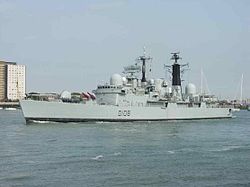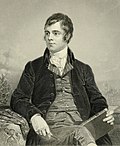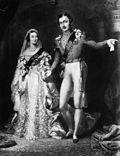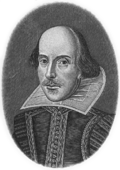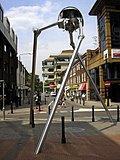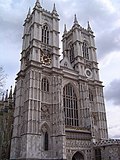Portal:United Kingdom
The United Kingdom Portal
 |
 |
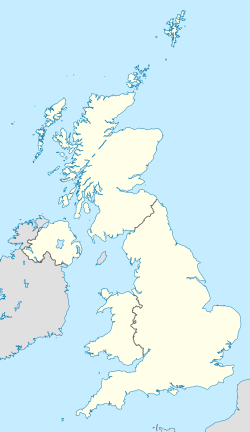
| |
The United Kingdom of Great Britain and Northern Ireland, commonly known as the United Kingdom (UK) or Britain, is a country in Northwestern Europe, off the coast of the continental mainland. It comprises England, Scotland, Wales, and Northern Ireland. The UK includes the island of Great Britain, the north-eastern part of the island of Ireland, and most of the smaller islands within the British Isles, covering 94,354 square miles (244,376 km2). Northern Ireland shares a land border with the Republic of Ireland; otherwise, the United Kingdom is surrounded by the Atlantic Ocean, the North Sea, the English Channel, the Celtic Sea, and the Irish Sea. The UK maintains sovereignty over the British Overseas Territories, which are located across various oceans and seas globally. The United Kingdom had an estimated population of over 68.2 million people in 2023. The capital and largest city of both England and the United Kingdom is London. The cities of Edinburgh, Cardiff, and Belfast are the national capitals of Scotland, Wales, and Northern Ireland, respectively.
The UK has been inhabited continuously since the Neolithic. In AD 43, the Roman conquest of Britain began; the Roman departure was followed by Anglo-Saxon settlement. In 1066, the Normans conquered England. With the end of the Wars of the Roses, the English state stabilised and began to grow in power, resulting by the 16th century in the annexation of Wales, and the establishment of the British Empire. Over the course of the 17th century, the role of the British monarchy was reduced, particularly as a result of the English Civil War. In 1707, the Kingdom of England and the Kingdom of Scotland united under the Treaty of Union to create the Kingdom of Great Britain. In the Georgian era, the office of prime minister became established. The Acts of Union 1800 incorporated the Kingdom of Ireland to create the United Kingdom of Great Britain and Ireland in 1801. Most of Ireland seceded from the UK in 1922 as the Irish Free State, and the Royal and Parliamentary Titles Act 1927 created the present United Kingdom.
The UK became the first industrialised country and was the world's foremost power for the majority of the 19th and early 20th centuries, particularly during the Pax Britannica between 1815 and 1914. The British Empire was the leading economic power for most of the 19th century, a position supported by its agricultural prosperity, its role as a dominant trading nation, a massive industrial capacity, significant technological achievements, and the rise of 19th-century London as the world's principal financial centre. At its height in the 1920s, the British Empire encompassed almost a quarter of the world's landmass and population, and was the largest empire in history. However, its involvement in the First World War and the Second World War damaged Britain's economic power and a global wave of decolonisation led to the independence of most British colonies. (Full article...)
Featured article
HMS Cardiff (D108) is a Type 42 destroyer, the third ship of the Royal Navy to be named in honour of the Welsh capital city of Cardiff. She was built by Vickers Shipbuilding and Engineering in Barrow-in-Furness, Cumbria and launched on 22 February 1974. During her career, Cardiff served in the Falklands War, where she shot down the last Argentine aircraft of the conflict and accepted the surrender of a 700-strong garrison in the settlement of Port Howard. During the 1991 Gulf War, her Lynx helicopter sank two Iraqi minesweepers. She later participated in the build-up to the 2003 invasion of Iraq as part of the Royal Navy's constant Armilla patrol; Cardiff thwarted attempts to smuggle oil out of the country, but was not involved in the actual invasion. Cardiff was decommissioned in July 2005, having earned two battle honours for service in the Falklands and Gulf wars. She is currently moored in Portsmouth Harbour, next to sister ship HMS Newcastle. Former servicemen have petitioned for her preservation as a museum ship and local tourist attraction at Cardiff, but her fate remains undecided. (Full article...)
Featured biography
Constantine II of Scotland was an early King of Scotland, known then by the Gaelic name Alba. His reign, like those of his predecessors, was dominated by the actions of Viking rulers in Britain and Ireland, particularly the Uí Ímair. During Constantine's reign, the rulers of the southern kingdoms of Wessex and Mercia, later the kingdom of England, extended their authority northwards into the disputed kingdoms of Northumbria. At first allied with the southern rulers against the Vikings, Constantine in time came into conflict with them. King Æthelstan secured Constantine's submission in 927 and 934, but the two again fought when Constantine, allied with the Strathclyde Britons and the Viking king of Dublin, invaded Æthelstan's kingdom in 937, only to be defeated at the great battle of Brunanburh. In 943 Constantine abdicated the throne and retired to the Céli Dé monastery of St Andrews where he died in 952. His reign of 43 years, exceeded in Scotland only by that of King William the Lion before the Union of the Crowns in 1603, is believed to have played a defining part in the gaelicisation of Pictland in which his patronage of the Irish Céli Dé monastic reformers was a significant factor. During his reign the words "Scots" and "Scotland" (Old English: Scottas, Scotland) were first used to mean part of what is now Scotland. (Full article...)
General images -
Subportals
WikiProjects
Things you can do
- Visit the British Wikipedians' notice board.
- The noticeboard is the central forum for information and discussion on editing related to the United Kingdom.
- Comment at the British deletion sorting page.
- This page lists deletion discussions on topics relating to the United Kingdom.
Featured pictures
Did you know -

- ... that when Sarah Jane Baker was released after 30 years, she was the United Kingdom's longest serving transgender prisoner?
- ... that in 1943, Bhicoo Batlivala led a group of Indian women to the House of Commons to request the release of Gandhi from prison?
- ... that Ed Miliband retweeted "Chaos with Ed Miliband" with a clown emoji during the October 2022 United Kingdom government crisis?
- ... that the historian and political journalist Lancelot Lawton addressed a House of Commons committee in London in 1935, beginning: "The chief problem in Europe to-day is the Ukrainian problem"?
- ... that neighboring British Sierra Leone and Liberia disputed their border, and the British Empire seized the disputed territory in 1885?
- ... that booing heard after the United Kingdom's entry at the Eurovision Song Contest 1984 was reportedly either a response to past football hooliganism, claims of lip syncing, or alleged plagiarism of the Supremes?
In the news
- 16 April 2025 –
- The United Kingdom suspends the import of cheese and meat products from the European Union to prevent the spread of foot-and-mouth disease. (BBC News)
- 16 April 2025 – Transgender rights in the United Kingdom, For Women Scotland Ltd v The Scottish Ministers
- The Supreme Court of the United Kingdom rules that legal gender is based upon biological sex for the purposes of the Equality Act 2010. (BBC News)
- 15 April 2025 – Sudanese civil war, Foreign aid to Sudan
- The European Union and its member states pledge €522 million (US$590 million) and the United Kingdom pledges £120 million (US$141 million) in humanitarian aid to Sudan to deliver food and supplies to over 650,000 internally displaced Sudanese people affected by the fighting between the Rapid Support Forces and the Sudanese Armed Forces. The two groups also call for an immediate ceasefire to end the war. (DW) (AP)
- 14 April 2025 – Russian invasion of Ukraine
- United Kingdom and the Russian invasion of Ukraine
- The United Kingdom sends £752 million ($990 million) to Ukraine for the purchase of surface-to-air missiles, artillery and spare parts for fighter aircraft, as part of an international loan programme funded primarily through seized Russian financial assets. (Reuters)
- 14 April 2025 – July Revolution
- A court in Dhaka, Bangladesh, along with the Anti-Corruption Commission, issues an arrest warrant for Tulip Siddiq, a United Kingdom MP who is the niece of ousted former leader Sheikh Hasina, for corruption allegations. Siddiq has rebuked the arrest warrant and called it a "smear campaign" against her. (DW) (BBC News)
Categories
Other UK-connected Wikipedias
Wikimedia
The following Wikimedia Foundation sister projects provide more on this subject:
-
Commons
Free media repository -
Wikibooks
Free textbooks and manuals -
Wikidata
Free knowledge base -
Wikinews
Free-content news -
Wikiquote
Collection of quotations -
Wikisource
Free-content library -
Wikiversity
Free learning tools -
Wikivoyage
Free travel guide -
Wiktionary
Dictionary and thesaurus


